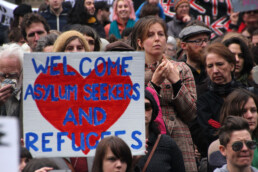Immigration Lawyers in Canada Discuss the Myths and Challenges of Asylum Seekers Who Have Crossed Illegally
The growing number of asylum seekers entering Canada from the U.S. at unofficial borders is causing concern amongst Canadians and the government. Many Canadians are concerned about the health and safety of the asylum seekers, especially those braving the frigid winter weather while crossing into Manitoba. Government officials and immigration lawyers in Canada are debating the implications of the Safe Third County Agreement and how to prevent more illegal border crossings.
Another question that has come up is whether these asylum seekers are jumping ahead in the refugee claims process, possibly decreasing the chances for other refugees across the world to immigrate to Canada. To clarify the Canadian immigration process for those who want to file a refugee claim, an immigration lawyer in Canada can help.
According to a recent CTV News article, there is a debate over whether or not asylum seekers are “queue jumping” the refugee claims process in Canada. Although one immigration lawyer in Canada says the government will have to put a limit on the number of refugees it accepts, another lawyer dispels the myth of asylum seekers “queue jumping.”
Currently, Canada has two refugee systems in place—one for those on Canadian soil and one for those in other countries, especially refugee camps. These two systems are not affected by each other, therefore, the number of refugees accepted on Canadian soil will not prevent refugees overseas from having a chance to immigrate to Canada.
No matter where the refugee claims are being made, asylum seekers must prove that they are at risk of persecution in their home countries. This brings up additional challenges for those entering Canada from the U.S. A Canadian immigration lawyer spoke to CBC News about the further difficulties faced by asylum seekers fleeing the U.S. Many of these asylum seekers are leaving the U.S. for fear of deportation because their refugee claims have been denied. Others may have refugee status in the U.S., but fear their future with Trump’s immigration policies in the U.S.
For those whose refugee claims have been denied in the U.S., they may lack supporting documentation for their claims. If they do not meet the Canada-USA Third Safe Country Agreement (‘Agreement’) exceptions, then they will not be able to make a refugee claim in Canada. For those who meet one of the exceptions to this Agreement, if they do not have the necessary evidential support for their claims or if their claim is found not to be credible, then they may be denied refugee status in Canada.
Asylum seekers who cross into Canada at unofficial borders do not have a better chance at gaining refugee status than those who cross legally or apply from overseas. In fact, those fleeing the U.S. may have a harder time proving their claims, because their subjective fear will be in question for having remained in the United States for a lengthy period of time without any legal status and for having failed to make a claim for protection in that country.
Share this article
Arghavan Gerami
Arghavan Gerami is the Founder and Senior Counsel at Gerami Law Professional Corporation ('PC'), a full-service immigration law firm in Ottawa, Ontario. Since 2011, Ms. Gerami has focused her practice on immigration and refugee litigation. Prior to that, Ms. Gerami worked at the Ministry of Attorney General and the Department of Justice and had the privilege of serving the Honourable Mr. Justice M. Evans at the Federal Court of Appeal on immigration and administrative law appeals. Ms. Gerami contributes to the Immigration Law Section of the Canadian Bar Association, the Canadian Association of Refugee Lawyers, and the United Nations High Commissioner for Refugees. Ms. Gerami has also published numerous journal articles and presented at various immigration and refugee law conferences and events across Canada.

